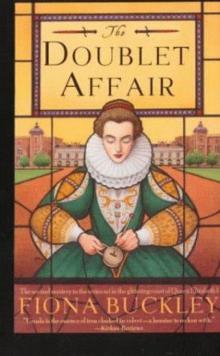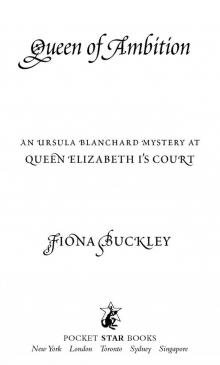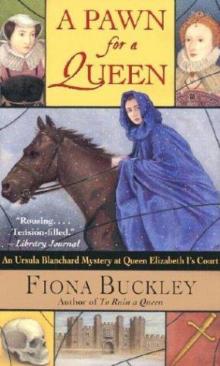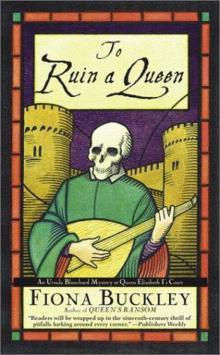- Home
- Buckley, Fiona
Queen of Ambition Page 4
Queen of Ambition Read online
Page 4
He broke off, as if lost for words. I said quietly: “Who is Master Woodforde?”
Cecil studied me thoughtfully. “You apparently managed to come across him before you’d been at court for five minutes. You have the oddest knack in these things. How did it come about?”
“It was pure chance. I was passing the door to Lady Lennox’s chambers when she burst out of it, in the middle of an argument with a small man in a black gown. She addressed him as Master Woodforde. He was saying that he would do anything to get back into her favor and she was saying that she would favor him most if he were in his coffin. I think he’d got into her rooms uninvited and been lying in wait to plead with her.”
“Yes. That is the man. His name,” said Cecil, “is Giles Woodforde—Dr. Giles Woodforde, strictly speaking, although he never seems to use the title. He likes to say that he’s an unassuming man. He was once in Lady Lennox’s service, as a tutor, originally to her son Henry Darnley, and after Darnley outgrew him, he stayed on to instruct other young people in her household. Then he was dismissed for some reason—I don’t know exactly what except that he managed to displease Lady Lennox in some way. Maybe religion had something to do with it. She’s a Catholic sympathizer and he’s from a good, solid Protestant family. He was born in Cambridge and studied at the university. After he left Lady Lennox’s service, he went back there and became a tutor in Latin and Greek at King’s College. He’s here now in the company of some other university representatives who have come to discuss details of the queen’s visit with me. Which brings me to the matter we were discussing when you joined us yesterday.”
“It sounded more like an argument than a discussion,” I said.
“It was! This is the situation. The queen is to arrive in Cambridge on the fifth of August. Now, these days, some of the students go home in the late summer, ostensibly to help their fathers get the harvest in, but some have slack modern attitudes and use that as an excuse to slip away early.”
Contemplating slack modern attitudes, the hardworking Cecil sniffed disdainfully. “And just for once,” he said, “I wish more of these youths were modern idlers! I also wish that they were controlled as they were in the last century when they weren’t allowed into the town at all unless a senior university member accompanied them. Now they have more freedom—and I am sorry to say that few of them are leaving the university early this year. The prospect of seeing the Queen is too exciting. Most will still be there on August fifth, ready to make pests of themselves if given the ghost of a chance. So, from the start, I have made it clear that the students are not to create a nuisance during the queen’s visit. They may be allowed to cheer respectfully from a distance as she rides in but no more.
“At least,” said Cecil with irritation, “that is how I planned it. But now … it seems that Woodforde has a half brother. Same mother, different fathers, which accounts for their different stations in life. While Giles Woodforde is a scholar, his older half brother, Roland Jester, runs a pie shop in what is called Jackman’s Lane in Cambridge, and it is a place where undergraduates are permitted to go. They are still not allowed to frequent taverns and aren’t encouraged to mix with the townsfolk, but nowadays they have to have some places in which to congregate and Jester’s Pie Shop is one of them. It serves meat pies and cheese and small ale which can be consumed on the premises. By agreement with the university authorities, it closes in the afternoon so as not to encourage students to linger over midday gatherings. But gather there they certainly do, and it appears that Jester overheard them planning a rag.”
“To do with the queen?”
“Yes. As she comes into Cambridge, she will pass through Jackman’s Lane and there she is to pause briefly, dismount, and take a seat on a small dais with a canopy, and a lady chosen to represent the women of the town will present her with a nosegay. Then she will mount her horse again and ride on into Queens’ College to receive a more official address. The students, apparently, conceived the wild notion of kidnapping the lady who is to present the flowers! Jester overheard them arguing over whether to do it after the presentation or before!”
“But …”
“But why didn’t he just report them to the authorities and put a stop to the whole thing? He did in a way; at least, he reported it to his half brother, Woodforde. But Woodforde apparently has sympathy with young people and instead of crushing this nonsense instantly,” said Cecil in tones of fury, “he promptly invented a mad scheme under which the rag would become part of the official welcome. The lady—a Mistress Smithson—that’s all I know about her—would present her flowers and then some students would rush up and a couple of them would have a brief mock fight with the queen’s guards while the others would whisk the lady out of sight into the pie shop. It would be a playlet, more or less. It would start with one of the students bowing before the queen and begging to be allowed to take Mistress Smithson away as a keepsake, or something equally absurd. And somehow or other,” said Cecil, “Woodforde persuaded Jester to agree and then actually convinced the fellows of the university that this scheme should be presented to me!”
“And you don’t like it?”
“Like it? Violence—even mock violence—right beside the royal dais? People waving swords about? But all the queen says is: oh, let the young men take part in the welcome and have their innocent fun! And now, as an afterthought, Woodforde has asked Dudley to be the queen’s champion and take part in the fight and that … that madman Dudley has volunteered to fight a mock duel with one of the students! Bah!” snorted Cecil.
“Dudley sees no harm in it either?”
“Dudley is taking the queen’s part, partly to annoy me because provoking me always amuses him but also because he wants to please her. He’s afraid of being sent to Scotland against his will. I am perfectly sure that he’s in no danger of any such thing but oddly enough, Dudley is less certain.”
I said: “And is all this something to do with the reason why I have been called from Withysham so much sooner than I expected? I have been told that I am to go to Cambridge almost at once, to make advance preparations for the queen’s visit. But have I other work as well? Are you afraid that there may be something behind this?”
Cecil sighed again, moving his bandaged foot uneasily. “Yes, I am, though I can’t imagine what it can be. Cambridge is as much a Protestant stronghold as ever it was; that’s true enough. During Queen Mary’s heresy hunts, there were a lot of very frightened people there; in fact, I gather from Woodforde that one of his relatives spent most of the previous reign in a state of terror and not without reason. His home was searched for heretical literature once, though nothing was found. Nowadays, the undergraduates nearly all come from families who are staunch supporters both of Elizabeth and the Protestant faith. But there is that link with Lady Lennox.”
“I doubt if it’s much of a link,” I said. “She obviously couldn’t bear the sight of Woodforde and wanted him out of her way. Is anything known against either Woodforde or this brother of his—Jester?”
“No, nothing, and don’t imagine I haven’t looked for something. Let me tell you about them. They’re both middle-aged. Woodforde is said to be forty-one and Jester is four or five years older and the only flaws in their otherwise virtuous pasts are that Woodforde once worked for Lady Lennox and was dismissed—and neither of those is actually a crime—and that Roland Jester’s wife left him.
“And I can understand that all too well,” Cecil said, with a glint of amusement. “Because the chief drawback to those two brothers as far as I can discover, is that they are inconceivably boring! It’s my belief that Mistress Jester ran away to avoid dying of ennui. I’ve been reading their correspondence—they write to each other whenever they’re apart—and more tedious letters you couldn’t imagine.”
“Really?” I frowned. I had, after all, seen Woodforde, hands pressed together as if in prayer, pleading with Lady Lennox for her favor, and I had seen the dignified and wealthy Lady Lennox, after an encounter w
ith him, looking as harassed as though a pack of hounds were snapping at her heels. I hadn’t seen Jester, but there was surely more to Master Woodforde than a tedious mentality.
I said as much. Cecil shrugged. “Maybe. But if you saw those letters, you’d think otherwise. While Woodforde has been here, his brother has written twice, paying out for a courier, and Woodforde has written back both times. Because of my suspicions, I had the letters intercepted—both ways—and I also had Woodforde’s quarters at court searched. Some old letters were found that Jester wrote to him while he was with the Lennoxes. The way they were written made me more suspicious than ever at first. They were rambling and disjointed, and sometimes awkwardly phrased, and at once, I thought: a cipher! So I had them tested, but …”
“Without success?” I prompted, since Cecil had stopped in midsentence.
“Completely without success,” said Cecil. “There wasn’t a trace. They obviously weren’t the kind of cipher that replaces letters by strange symbols or by other letters; but there are other ways of writing secret messages. I have heard of codes in which one takes every third—or fourth or fifth or sixth or whatever—letter or word to extract the message. It takes skill to write a letter that conceals a message in that form and still reads in an ordinary, sensible fashion, but it can be done. Sometimes there’s a pattern of intervals; you have to take the second, fourth, sixth, eighth letter or word, and then start the sequence again. That sort of code can be difficult to break but I have clerks who can do it, all the same. They applied their best efforts to the correspondence between Woodforde and Jester and found nothing but gibberish.”
He sighed again, irritably. “We even tested for a double cipher—I mean applying letter-substitution ciphers to the gibberish. There was still nothing. No sign of a code. The brothers aren’t exchanging secret correspondence on treasonous plots. The letters are just what they seem—dull, trivial outpourings from dull, trivial minds.”
“What sort of things do they say?” I asked curiously.
“Well, Woodforde’s first letter back to Jester starts off quite reasonably with his impressions of the court and the meetings he’s attended but then he drifts off into a stream of haphazard banalities. He doesn’t like jesters—except for his brother and his niece!—there’s a creeper rattling near his window at night, he can hear sheep in the distance, he’s bought a new blue doublet … all his letters meander on in the same way. Roland Jester isn’t much better. They go in for occasional poetic flights—Woodforde’s, mostly. Jester’s the duller of the two. He bothered to hire a courier in order to complain that the girls who work in his shop giggle too much and that his furniture is getting old!” I had rarely heard Cecil sound so acid.
“But you’re still suspicious?” I said.
“Yes. I’d be glad to be proved wrong—but yes.”
I thought hard. “Judging by the exchange I witnessed between Woodforde and Lady Lennox,” I said, “the link between them doesn’t look significant. All the same … how much would Lady Lennox grieve, I wonder, if anything were to happen to Elizabeth? I fancy she’d attend the funeral in a heavy black veil to hide her laughter.”
“Really, Ursula!” Poor Cecil looked quite shocked. “You have the most salty way of putting things sometimes.”
I smiled. My husband Matthew’s pet name for me was Saltspoon. “But even if harm is planned against the queen,” I said, “she will be a public figure in Cambridge! If anyone is lying in wait with a firearm or a crossbow, they will have many chances to shoot without having to create one in this elaborate way.”
“She won’t be a target on that dais in Jackman’s Lane if I have anything to do with it,” said Cecil. “It will have a canopy and sides and no vantage point from the front that an assassin could use. But I’m not happy, Ursula, no. I feared that the queen would be obstinate, but I did convince her that you should go to Cambridge early as one of her harbingers. I remarked on the importance of this visit and said that you would be an ideal choice: you would cast a feminine eye over the arrangements, and you are highly observant. From my point of view, you are also discreet. I believe in discretion. Plots against the queen are not a subject for gossip in my opinion. I prefer the very idea to be unmentionable and, therefore, unthinkable. You, I know, will not gossip.”
“Thank you,” I said.
“The queen raised no objection. These arrangements are my responsibility anyway,” said Cecil. “But your real purpose will be to discover, if you can, what is going on, and if this silly playlet, this ridiculous entertainment, is what it seems, or not. How you are to do it, I don’t know, but you are good at finding ways, in my experience. Investigate that pie shop, find out all you can about the half brothers and their associates, and the students, too. Look out for coincidences. In my view,” said Cecil, with another glint of amusement, “if there were an eleventh commandment, it would be Never Trust Coincidences. You will not be alone in your task. I have also discussed it with Rob Henderson. You know that he is to lead your party of harbingers, of course. That is at his own request. He will be conducting the same inquiries as yourself. Sometimes two heads are better than one. Rob is the official leader but I wish you to cooperate as partners in the inquiry. Both of you will be paid for your services as harbingers and as inquiry agents.”
Putting Withysham to rights was eating money. I thought about the extra income and inclined my head. “I will do my best,” I said.
I might be, strictly speaking, Madame de la Roche, wife of Matthew de la Roche of Blanchepierre in the Loire Valley. But when I was in England, I was Ursula Blanchard, Lady of the Queen’s Presence Chamber and widow of Gerald Blanchard, a man who had once carried out secret tasks for one of Elizabeth’s great men and who had inadvertently taught his wife a good deal about such things.
I always wore an underkirtle and a divided overskirt and inside the overskirt I stitched hidden pouches where I could carry, among other things, a small dagger in a little sheath and a set of lockpicks.
I had never used the dagger, although I had been responsible for sending men—and one woman—to their death by other means. I had used the lockpicks quite often.
When I was in England, I was a secret agent, on behalf of Elizabeth, in the direct employ of Sir William Cecil.
5
Respectable Employment
The Hendersons had been friends of Sir William Cecil’s for many years. I first came to know them when he arranged for them to foster Meg for me at a time when I could not care for her myself. Rob Henderson was one of the few people who knew of my secret work, and at Cecil’s request, he had often helped me with escorts, armed assistance, and the like, backed up by a mandate from Cecil to carry out arrests if required.
He had done that for me during the task I had recently carried out on the Welsh border. Nevertheless, things had changed during the two years before that, when I had been away in France. I had gathered by now that Rob Henderson had in the interim become a full-fledged agent. His good-looking, candid face, with its fashionably trimmed beard, and the dashing clothes he liked to wear, were an advantage because they amounted to a disguise.
“You don’t look like an agent,” I said as we made our plans for the journey. “Any more than I do.”
“You,” said Rob frankly and not for the first time, “are a young woman and in my opinion you shouldn’t be an agent. I know you’re good at it, but all the same, I wish you could have stayed at Thamesbank and kept Mattie company for a while. I’m worried about this new baby. We didn’t expect another so late in life. Oh well. We must put Elizabeth’s interests first and both do our best, I suppose.”
The other members of our party included three court officials: a Yeoman Purveyor, whose special task was to make sure that when the queen and her enormous entourage took the road, they would always be properly fed; a junior Gentleman Usher, who was to make certain that everyone would be accommodated in suitably furnished rooms; and a conscientious junior Officer of the Wardrobe, who had to ensure am
ong other things that there was space for everyone’s clothing, and robing rooms for Her Majesty wherever she was likely to need them. He was the one who later on caused a stir in King’s College by insisting that a retiring room be built in its chapel.
We would be followed, a week or so before the arrival of the queen, by a party of senior Gentlemen Ushers, who would make sure that everything we had arranged was as it should be, and they would in turn be followed by Sir Robert Dudley and Sir William Cecil in person, to make sure that the Gentlemen Ushers hadn’t made any mistakes either. Our party was the first and the humblest and also the one with the most work to do.
We had our own assistants, of course. Along with us rode a gaggle of valets and clerks, the latter with slates and abacuses sticking out of their saddlebags, and of course we had our entourage of personal servants, which in my case meant Dale and Brockley, and in Rob’s case meant three of his menservants, all former soldiers and all equipped with swords as well as fashionable cloaks and dashing hats.
Giles Woodforde and the university dignitaries were due to return to Cambridge but they did not ride in our company. I had begun to have a shadowy idea about a way of pursuing my investigation and I didn’t want Woodforde to know who I was. I didn’t think he had noticed me during that encounter in the corridor; he had been too taken up with Lady Lennox. “As far as he’s concerned, I ought to stay unnoticed. I think I should keep out of his sight,” I told Cecil.
Cecil obligingly made sure that the university men went off separately, ahead of us. Since Cecil was the Secretary of State and the chancellor of Cambridge as well, no one argued.
The other harbingers had also to examine the arrangements at the houses where the queen would stay on her way to Cambridge, but Rob and I had no time to lose. The queen was due in Cambridge in less than three weeks. If there was anything to discover, we must find it before she got there. Again, Cecil had smoothed our way by giving straightforward orders. The rest of the harbingers were to deal with the intervening houses as they went along; Rob and I were to go straight on to Cambridge, the royal destination, and begin work there.

 The Siren Queen: An Ursula Blanchard Mystery at Queen Elizabeth I's
The Siren Queen: An Ursula Blanchard Mystery at Queen Elizabeth I's The Doublet Affair (Ursula Blanchard Mysteries)
The Doublet Affair (Ursula Blanchard Mysteries) Queen of Ambition
Queen of Ambition A Pawn for a Queen: An Ursula Blanchard Mystery at Queen Elizabeth I's (Ursula Blanchard Mystery at Queen Elizabeth I's Court)
A Pawn for a Queen: An Ursula Blanchard Mystery at Queen Elizabeth I's (Ursula Blanchard Mystery at Queen Elizabeth I's Court) To Ruin A Queen: An Ursula Blanchard Mystery at Queen Elizabeth I's Court
To Ruin A Queen: An Ursula Blanchard Mystery at Queen Elizabeth I's Court